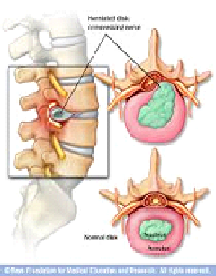Herniated Disk Symptoms, Causes, Diagnosis and Treatment

What Is Herniated Disk ?
A problem associated with one of the disks (rubbery cushions) between vertebrae (individual bones) that pile up to make the spine is known as a herniated disk.
Our spinal disk appears like a small jelly donut having a soft center covered inside a stronger exterior. Occasionally, known as a ruptured disk or a slipped disk, this condition “Herniated Disk” happens when the soft “jelly” drives out through an obstruction in the stronger exterior.
It is not easy to diagnose herniated disk, sometimes it appear on the spinal images of a person without any symptoms of a disk issue. However, herniated disk is very painful. Mostly, herniated disks appear in lower back, even though they might occur in cervical spine (neck).
What Are The Symptoms Of Herniated Disk ?
The common symptoms of a herniated disk are:
- Muscular (arm or leg) pain: If herniated disk is present in lower back, typically you will sense the severe pain in the thigh, buttocks as well as calf.
- Tingling or Numbness: People suffering from herniated disk sometimes experience tingling or numbness in the affected parts of the body.
- Weakness or Paleness: Muscles which are affected by the nerves tend to weaken. This may further results in the mishap, or impaired capability to hold or lift items.
What Are The Causes Of Herniated Disk ?
Herniated Disk is most commonly caused due to slow, age-related deterioration known as disk degeneration. As time passes, spinal disks may lose their water content. Further, resulting in less elastic and become more prone to rupturing or tearing with a small twist or strain.
It is not easy to find out the exact herniated disk cause. At times, using the back muscles in place of thigh and leg muscles to lift heavy, huge objects can progress to a herniated disk, like turning, twisting as well as lifting. Not often, a trauma due to fall or a hit at the back might reason a herniated disk.
How Herniated Disk Is Diagnosis ?
During physical examination, the doctor will check tenderness of the back. She or he wants you to lay down flat and move legs into several directions to determine the pain cause. Also, your doctor might perform a neurological exam, to examine:
- Muscular strength
- Reflexes
- Walking capability
- Capability to feel vibration, light-touches or pinpricks.
It is very important to check your nerves or reflexes. To achieve this, further tests need to be performed such as:
- Imaging test (for instance: X-ray, CT scan, MRI, Myelogram).
- Nerve tests.
How Herniated Disk Is Treatment ?
The disease, herniated disk is treated by the following drug therapy:
- OTC medications: like ibuprofen (Motrin IB, Advil) or naproxen (such as Aleve).
- Narcotics: narcotic medications are prescribed by the doctor if pain is still present after taking OTC medications. Narcotics include: codeine or acetaminophen-oxycodone combination (Oxycontin, Percocet). Constipation, Nausea, Sedation, and Confusion are the side effects of these drugs.
- Nerve-damage pain therapy: Different Drugs like gabapentin (such as Gralise, Neurontin, Horizant), duloxetine (such as Cymbalta), pregabalin (such as Lyrica), amitriptyline and tramadol (such as Ultram) often assist get rid of nerve-damage pain.
- By : Natural Health News




